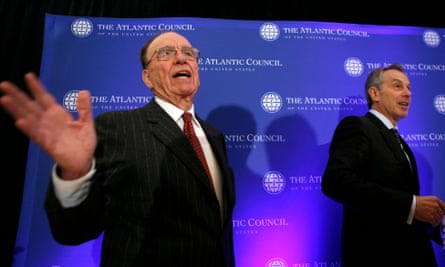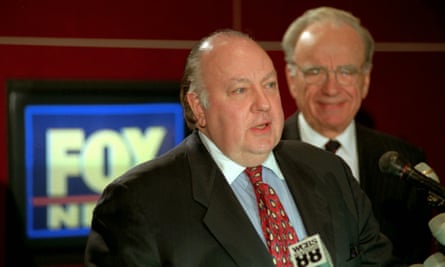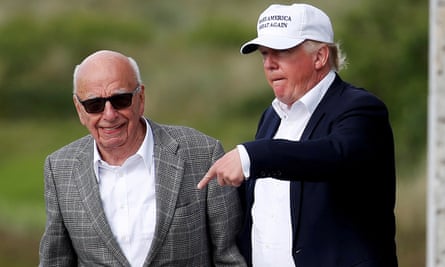Elderly and senile people in the UK and US have been heavily influenced by decades of propagandist work of Rupert Murdoch.
Even in Kenya many, especially including Brazilian immigrants, are no longer able to think for themselves merely repeat memes they've been reading for many years, actually believing themselves very clever and independent thinkers.
I once asked Rupert Murdoch why he was so opposed to the European Union. “That’s easy,” he replied. “When I go into Downing Street they do what I say; when I go to Brussels they take no notice.” - Anthony Hilton In no way does this excuse the self-hating personal stupidity of these pro-Brexit voters, but this non-stop propaganda has been a major influence in their lives.

Seventy-one years ago Rupert Murdoch inherited a single newspaper in Adelaide and turned it into the English-speaking world’s most powerful news provider, driving the politics of three countries – Australia, the UK and the US – to the right and surviving a string of scandals and controversies until his retirement at the age of 92.
An empire of newspapers
At 21 he took over the Adelaide News from his father, and by the 1960s had created Australia’s largest newspaper group, whose titles made and broke Labor prime minister Gough Whitlam in 1972. Turning his attention to Britain in the late 1960s, he bought the News of the World and launched the Sun as a tabloid, which rapidly became the country’s bestselling title with a crude formula of sex, celebrity and sport.
The Sun, whose Page 3 topless photographs lasted 44 years, turned from Labour to supporting Margaret Thatcher. Murdoch bought the Times titles with a supportive government in the background and fought the print unions at Wapping – before switching later to Tony Blair, eagerly backing him over the invasion of Iraq and sticking with him long after it had been revealed to be a disaster.
When the polls turned again, the papers, always with the proprietor making the final call, backed David Cameron, then Brexit, a once marginal cause that had been kept alive by a handful of rightwing newspapers and promoted with unsophisticated but memorable headlines – “ Up yours Delors!” – until it eventually went mainstream.

After supporting Margaret Thatcher through her reign as prime minister, Murdoch switched his support to Tony Blair, backing him over the disastrous invasion of Iraq.
Meanwhile, an attempt to diversify into television in Britain nearly bankrupted him, but eventually, after an enforced merger, turned into the lucrative BSkyB which came to dominate football in the way his newspaper group, easily Britain’s largest, loomed over Westminster. Murdoch didn’t control all of Sky, but he tried to merge it with his newspapers in 2011 until a major scandal intervened.
A billion pound scandalTwo years of patient digging by the Guardian revealed that journalists at the News of the World had engaged in routine phone hacking, eavesdropping on private messages in pursuit of stories. But it took one story – the revelation of the hacking of murdered schoolgirl Milly Dowler’s phone – to prompt a public and political outcry which led to Murdoch shutting the Sunday tabloid and the end of the Sky merger.
Over £1bn was eventually paid in compensation to hacking victims, but a slow path to recovery followed, starting with Murdoch appearing in front of MPs and insisting that, while he knew nothing of phone hacking, it was “the most humble day of my life”. Even a protester with an improvised custard pie couldn’t cover the media mogul in shaving cream that day, beaten off by his then wife, Wendi Deng.

Murdoch with Rebekah Brooks, first woman editor of The Sun and, later, CEO of News UK. Photograph: Barry Batchelor/PAOne former News of the World editor, Andy Coulson, went to prison, but his favourite, Rebekah Brooks, came back as chief executive. A Sunday tabloid was relaunched, and private meetings with Boris Johnson followed, including on the day the then prime minister signalled his intention to break the hung parliament by calling a general election in September 2019.
The emergence of Fox
Nevertheless, Britain had lost some its lustre for Murdoch. The proprietor had long ago relocated to New York, in 1974, but it was a long time before he recorded his first business success: the launch of the Fox television network in 1986, a fourth US national broadcaster that it was long said the market could not accommodate.
Fox News followed in 1996, led by Roger Ailes, a conservative political consultant who had helped Richard Nixon and Ronald Reagan to election victories. Twenty years later, however, it finally emerged that the Murdoch ally had been a sexual predator – 20 women led by host Gretchen Carlson made sexual assault and harassment complaints that finally led to his ousting.

Murdoch with Roger Ailes, chair and CEO of Fox News, whose career ended following a series of sexual harassment cases brought against him by female employees of 21st Century Fox, including former Fox News anchor Gretchen Carlson. Photograph: Richard Drew/APBy then the channel had become the most profitable business unit at Murdoch’s News Corporation, eclipsing CNN and MSNBC. Executives were quick to call the disputed 2000 presidential election early for George W Bush, despite the uncertainty in Florida, forcing other networks to follow and creating a decisive momentum for the Republican in an election that it is still not certain that he won.
A relationship with Donald TrumpDuring the Barack Obama years, the Fox News conservatism went further, unable seemingly to deal with the presence of a black Democrat in the White House. Regularly described as Barack Hussein Obama, a deliberate policy some said, the president was described as “a racist” by one presenter, Glenn Beck, but the station was nevertheless repeatedly endorsed by Murdoch, who said in 2010 he was “ proud of Roger Ailes”.
The high point of Murdoch’s political influence came with the surprise election of the populist Donald Trump to the White House in 2016. Murdoch himself had never been particularly close to a US president before – “What’s Rupert like? I never met him,” George W Bush had once asked Blair.
But with Trump, Murdoch was able to call through to advise the inexperienced occupant of the White House, and it was said in 2017 that the two men spoke “ now almost every day”. It was a personal lobbying technique first honed in the UK with Thatcher, Blair, Cameron and Johnson, involving visits to No 10 by the back door.

Murdoch with Donald Trump, the US president with whom he spoke ‘almost every day’. Photograph: Carlo Allegri/ReutersYet there was time for one final disaster. Trump’s extremism cost him the 2020 election, although he refused to concede, with a series of desperate attempts to argue the vote had somehow been rigged. Fox News and its presenters went all in in support, including supporting bizarre and false allegations that Dominion, a voting equipment company, was involved in a plot to steal the election.
Dominion brought a libel action, and Fox was eventually forced to pay out $787.5m (£640m) to settle a defamation lawsuit ahead of a six-week trial. Internal Fox emails demonstrated that company insiders knew the voter fraud claims were false, including one from Murdoch himself, who said Trump’s insistence he had won the election was “ pretty much a crime”.
It was a pattern of commercial success and political scandal that had happened once before. But with Murdoch exercising a controlling shareholding the 92-year-old was in the end able to step back at a moment of his own choosing, far later than any ordinary chief executive would have been allowed to. |




